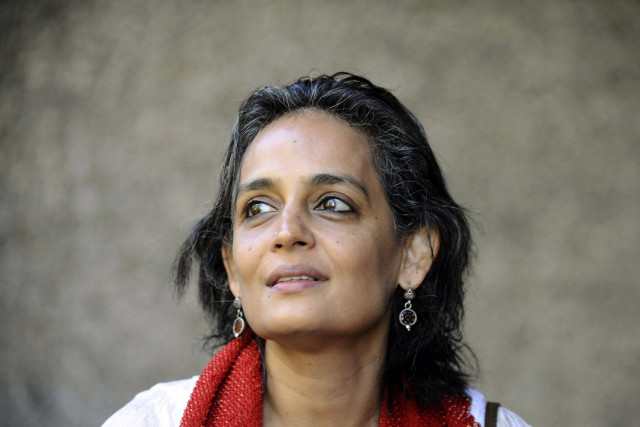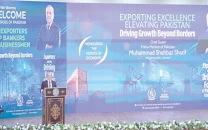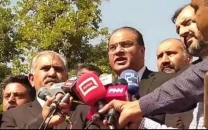Arundhati Roy averse to setting down writing rules
Acclaimed author distances herself from ‘second profession’ of activism

PHOTO: AFP
“Writing is the most appropriate way of expressing trauma and complications, and I will be the last one to make rules for writing in terms of impression and style,” said the Man Booker prize winner while speaking at a conference on "Getting our bearings right: literature, society and prosperity".
The seminar had been organised by the English department of the International Islamic University Islamabad (IIUI) in collaboration with varsity's constituent unit Iqbal Institute for research and dialogue (IRD).
“I have always quarrelled with this word ‘activist’,” Roy said during her talk via video conference. “I think it is a very new word and I do not know when it was born, but it was recent.”
“I do not want to have a second profession added to writing,” said the author of “The Ministry of Utmost Happiness” — the book was long-listed for the Man Booker Prize in 2017 but ultimately lost out to Lincoln in Bardo.
Asked about if she could shed light on the what exact place was referenced in her recent novel — which came nearly 20 years after her first and critically acclaimed novel of ‘A God of Small Things’, she stated that it is a book that does not pretend to universalise or conceptualise anything. Rather, it is a book of great detail about a place.
To a question about her fiction and non-fiction works, she maintained, “I do not actually see my fiction and non-fiction as extensions of each other.”
"This novel (The Ministry of Utmost Happiness) has been ten years in the writing, but I think in the 20 years between The God of Small Things and now, I have travelled and have been involved with so many things that are happening and written about them at length" she explained.
The conference was attended by as many as 25 national and international speakers other than Roy including Dr Asif Farrukhi, Dr Shahid Siddique and others.
Speakers called for a devising a comprehensive policy on the adoption of the national language and recommended establishing translation centres at varsities.
Dr Siddiqui, an educationist and the Dean of Social Sciences at the National University of Modern Languages (NUML) in Islamabad, also delivered a keynote on “Language, life chances and the Matthew effect.”
He discussed the gloomy picture of mishandling and inappropriate policies towards the adoption of Urdu.
He maintained that literature is a political tool and not confined to entertainment only.
He added that language and literature are the best tools for the construction of society and also determines to break or make stereotypes.
IIUI Academics Vice President Dr Tahir Khailiy vowed that such conferences will now be a part of the varsity’s annual activity calendar to determine the role of literature in the prosperity and reconstruction of society.
Dean of Faculty of Social Sciences Dr Ayaz Afsar said that one of the purposes of the conference was to encourage debate, interaction and networking among the national and international experts and students.
“I would like to propose that the goal of the English departments should be reclaiming the primacy of asceticism in literary criticism,” he added.
Published in The Express Tribune, April 29th, 2019.



















COMMENTS
Comments are moderated and generally will be posted if they are on-topic and not abusive.
For more information, please see our Comments FAQ